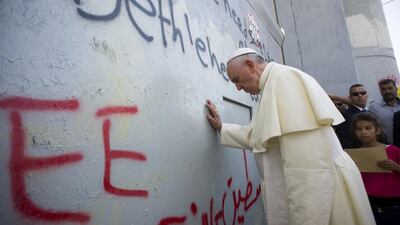BETHLEHEM, West Bank // Pope Francis landed in the West Bank town of Bethlehem on Sunday in a symbolic nod to Palestinian aspirations for their own state as he began a busy second day of his Middle East pilgrimage.
Previous popes always came to the West Bank after first arriving in Tel Aviv, Israel.
Pope Francis, however, landed at a Bethlehem helipad from Amman aboard a Jordanian helicopter and immediately headed into an official welcoming ceremony and meeting with Palestinian president Mahmoud Abbas.
His arrival in the West Bank marks the start of the most sensitive part of his three-day Middle East tour aimed at forging regional peace and easing an age-old rift within Christianity.
The pope made an unscheduled stop at the West Bank barrier after calling for an end to the “increasingly unacceptable” Israeli-Palestinian conflict.
He dedicated his mass to the theme of children, ahead of a meeting with children in the Dheisheh refugee camp and a lunch with refugee families in a huge morale boost for Palestinians, who have called on him to help end Israeli occupation.
After meeting Mr Abbas, the pope will drive through Bethlehem in an open-top car to Manger Square where he will give a mass that will be attended by nearly 10,00 people.
In its official programme, the Vatican referred to Mr Abbas as the president of the “state of Palestine”.
“The fact that he is coming straight from Jordan to Bethlehem, without going through Israel” is a tacit recognition of a Palestinian state, said Hanan Ashrawi, a Palestinian Christian who is a senior official in the Palestine Liberation Organisation.
In November 2012, the United Nations General Assembly overwhelmingly recognised a “state of Palestine” in the West Bank, Gaza and east Jerusalem – lands Israel captured in the 1967 war – as a non-member observer.
The recognition still has little meaning on the ground, with Israel remaining in full control of east Jerusalem, which it annexed in 1967, and the West Bank.
However, it has enabled the Palestinians to start seeking membership in UN agencies and accede to international conventions in a further upgrade of their status.
The pontiff is expected to press the Vatican’s call for a two-state solution to the Israeli-Palestinian conflict during his meeting with Mr Abbas and when he arrives in Israel on Monday.
Early Sunday, police arrested 26 Israelis for throwing stones at police officers and causing disturbances at a Jerusalem holy site where the Pope will celebrate Mass at the end of his trip, Israeli police spokesman Mickey Rosenfeld said.
Mr Rosenfeld said 150 religious Jews demonstrated at the holy site to protest rumours that Israel will transfer control of the site to the Vatican.
According to Catholic tradition, the site marks the Last Supper of Jesus.
But devout Jews believe the biblical King David is buried there, and they protest Christian prayer at the site.
*Associated Press, with additional reporting from Agence France-Presse

